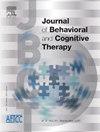Acceptability and feasibility of a Taekwondo mindful movement intervention in Dialectical Behavior Therapy
IF 1.6
Q3 PSYCHIATRY
引用次数: 0
Abstract
Borderline personality disorder (BPD) is often comorbid with disordered eating behaviors. Effective treatments are critically needed for this complex population. Mindful movement interventions may represent a promising, adjunctive treatment option for individuals with BPD symptoms, especially those with co-occurring disordered eating. Previous work has demonstrated that Taekwondo, a Korean martial art emphasizing mind–body connections, is an acceptable and feasible candidate intervention. This pilot study (N = 24, 79.2% female, Mage = 31.2; 75.0% white) examined acceptability and feasibility of a Taekwondo and Mindfulness intervention in a Dialectical Behavior Therapy (DBT) intensive outpatient program (IOP) using a within-subjects design. Patients consistently rated Taekwondo groups highly regarding average satisfaction and effectiveness (3.6–4.7/5), and showed significant state-level improvements in anxiety (p = 0.001. d = 0.76), sadness (p = 0.002, d = 0.74), happiness (p < 0.001, d = −0.86), and relaxation (p < 0.001, d = −0.96) following group participation. Conversely, significant changes in sadness (p = 0.082, d = 0.40) and happiness (p = 0.078, d = −0.41) were not observed following Comparison Groups (Traditional Mindfulness). Binge-eating frequency was correlated with greater reductions in sadness (r = 0.43, p = 0.041) following Taekwondo groups, but not Comparison Groups (r = 0.01, p = 0.977). Compared to non-purging individuals, patients reporting purging showed greater increases in happiness following Taekwondo groups (p = 0.024, d = 1.23), but smaller increases following Comparison Groups (p = 0.037, d = −1.24). Together, preliminary findings suggest an additive benefit of Taekwondo as a mindful movement adjunct to treatment.
跆拳道正念动作干预辩证行为疗法的可接受性与可行性
边缘型人格障碍(BPD)通常与饮食行为紊乱并存。这一复杂人群迫切需要有效的治疗方法。正念运动干预可能是一种有希望的辅助性治疗选择,对于有BPD症状的个体,特别是那些同时发生饮食失调的个体。先前的研究表明,跆拳道是一种强调身心联系的韩国武术,是一种可接受且可行的候选干预手段。本初步研究(N = 24,女性79.2%,Mage = 31.2;75.0%白人)使用受试者内设计检验了跆拳道和正念干预在辩证行为治疗(DBT)强化门诊项目(IOP)中的可接受性和可行性。患者对跆拳道组的平均满意度和有效性均给予较高评价(3.6-4.7/5),焦虑水平也有显著改善(p = 0.001)。d = 0.76),悲伤(p = 0.002, d = 0.74),幸福(p & lt;0.001, d = - 0.86),松弛(p <;0.001, d = - 0.96)。相反,在对照组(传统正念)中,悲伤(p = 0.082, d = 0.40)和快乐(p = 0.078, d = - 0.41)没有显著变化。在跆拳道组之后,暴食频率与悲伤程度的显著降低相关(r = 0.43, p = 0.041),但与对照组无关(r = 0.01, p = 0.977)。与未排毒的患者相比,排毒患者在跆拳道组后的幸福感增加更大(p = 0.024, d = 1.23),但在对照组后的幸福感增加较小(p = 0.037, d = - 1.24)。总之,初步的研究结果表明,跆拳道作为一种辅助治疗的正念运动有附加的好处。
本文章由计算机程序翻译,如有差异,请以英文原文为准。
求助全文
约1分钟内获得全文
求助全文
来源期刊

Journal of Behavioral and Cognitive Therapy
Psychology-Clinical Psychology
CiteScore
3.30
自引率
0.00%
发文量
38
审稿时长
60 days
 求助内容:
求助内容: 应助结果提醒方式:
应助结果提醒方式:


